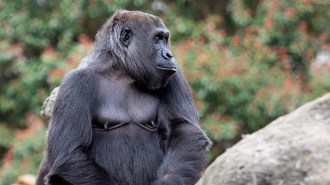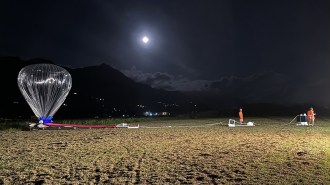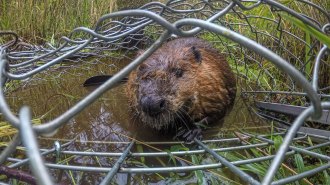Uncategorized
-
 Chemistry
ChemistryThese researchers are unlocking Renaissance beauty secrets
An art historian has teamed up with chemists to uncover the science behind cosmetics used around 500 years ago.
-
 Humans
HumansWhy humans have more voice control than any other primates
Unlike all other studied primates, humans lack vocal membranes. That lets humans produce the sounds that language is built on, a new study suggests.
By Asa Stahl -
 Earth
EarthThe Arctic is warming even faster than scientists realized
The Arctic isn’t just heating up two to three times as quickly as the rest of the planet. New analyses show that warming is almost four times as fast.
-
 Health & Medicine
Health & MedicineMultiple sclerosis has a common viral culprit, opening doors to new approaches
Learning how the common Epstein-Barr virus may trigger multiple sclerosis could help experts design better treatments — or perhaps end the disease.
-
 Animals
AnimalsZoo gorillas use a weird new call that sounds like a sneezy cough
A novel vocalization made by the captive great apes may help them draw human attention.
By Meghan Rosen -
 Life
LifeSea sponges launch slow-motion snot rockets to clean their pores
Sea sponges rely on a sneezing mechanism to clear their pores, using mucus to flush out debris. This mucus provides food for other marine life.
By Jude Coleman -
 Space
SpaceHow balloons could one day detect quakes on Venus
A new study opens the door for future balloon-based missions to study the geology of other worlds.
By Freda Kreier -
 Animals
AnimalsRelocated beavers helped mitigate some effects of climate change
Along a river in Washington state, the repositioned beavers built dams that lowered stream temperatures and boosted water storage.
-
 Cosmology
CosmologyScientists mapped dark matter around galaxies in the early universe
A technique used to reveal dark matter could also shed light on a disagreement about the clumpiness of matter in the cosmos.
-
 Astronomy
AstronomyMini-Neptunes may become super-Earths as the exoplanets lose their atmospheres
Starlight is eroding the atmospheres of a handful of gassy exoplanets that are a bit smaller than Neptune, gradually exposing the rocky cores within.
By Liz Kruesi -

-

Our enduring fascination with outer space
Editor in chief Nancy Shute discusses science's fascination with space, from 25 years of Mars rovers to the James Webb Space Telescope's mind-blowing first images.
By Nancy Shute